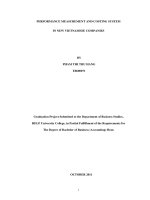Lecture Performance management: Session 1 - Osman Bin Saif
Bạn đang xem bản rút gọn của tài liệu. Xem và tải ngay bản đầy đủ của tài liệu tại đây (361.22 KB, 41 trang )
Session:
One
HRM-755
PERFORMANCE
MANAGEMENT
OSMAN BIN SAIF
1
Self Introduction
•
•
Finance Graduate;
–
MSC. Accounting and Finance (University of
Exeter, UK)
–
MBA- Bi-Majors Finance / HRM (SZABIST,
Islamabad)
–
Certified Financial Consultant (IFC , Canada)
–
Certifications in Project Management,
Monitoring and Evaluation and Research
Policy Development and Meta Futures.
Consultant with SDPI
2
Course Objective
•
•
This course will examines the importance
of an effective performance management
system in helping organizations define and
achieve short and long term goals.
It explains and reinforces the concept that
performance management is not a onetime supervisory event, but an ongoing
process of planning, facilitating,
assessing, and improving individual and
organizational performance.
3
Course Objective (Contd.)
•
In addition, the course emphasizes the
importance of measuring the effectiveness
of human resource activities that are
designed to enhance individual and
organizational performance.
4
Key Learning Outcomes
After the successful completion of this
course, students will be able to :
•
1. Design an organization’s performance
management process that is compliant
with law and supports organizational
mission and strategy.
5
Key Learning Outcomes
(Contd.)
•
2. Compare and contrast various
organizational performance management
programs and best practices and define
attributes of effective performance
management systems.
6
Key Learning Outcomes
(Contd.)
•
•
3. Employ job-related performance
standards and performance indicators that
reflect the employee’s range of
responsibilities.
4. Assess how increased employee
involvement can contribute to effective
performance and coach employees to
identify career paths and resources
available to support individual 7
Key Learning Outcomes
(Contd.)
•
5. Identify and communicate appropriate
actions with employees (e.g. training and
development, wage increase, promotion,
bonus etc.) based on their performance
strengths and weaknesses.
8
Course Contents/ Structure
•
SECTION 1: STRATEGIC AND
GENERAL CONSIDERATIONS
–
CHAPTER 1: Performance Management and
Reward System in Context.
–
CHAPTER 2: Performance Management
Process
9
Course Contents/ Structure
•
SECTION 2: SYSTEM
IMPLEMENTATION
–
CHAPTER 4: Defining Performance and
Choosing a Measurement Approach
–
CHAPTER 5: Measuring Results and
Behavior
10
Course Contents/ Structure
•
SECTION 3: EMPLOYEE
DEVELOPMENT
–
CHAPTER 8: Performance Management and
Employee Development
–
CHAPTER 9: Performance Management
Skills
11
Course Contents/ Structure
•
SECTION 4: REWARD SYSTEM, LEGAL
ISSUES, AND TEAM PERFORMANCE
MANAGEMENT
–
CHAPTER 10: Reward Systems and Legal
Issues
–
CHAPTER 11: Managing Team Performance
12
Performance Management
13
Performance Management
(Contd.)
•
•
•
There is something very wrong with this
picture, which unfortunately happens all
too frequently in many organizations.
Although Sally’s HR department calls this
process “performance management”, it is
not.
Then what is “Performance
14
Performance Management
(Contd.)
•
Definition:
–
“Performance management is a
continuous process of identifying,
measuring, and developing the
performance of individuals and
teams and aligning performance with
the strategic goals of the
organization”.
15
Performance Management
(Contd.)
•
lets consider each of the definition’s two main
components.
•
Continuous process:
–
Performance management is ongoing. It
involves a never ending process of setting
goals and objectives, observing
performance ,and giving and receiving
ongoing coaching and feedback.
16
Performance Management
(Contd.)
–
Alignment with strategic goals:
•
•
Performance management requires that managers
ensure that employee’s activities and output are
congruent with the organization’s goals
and consequently, help the organization gain a
competitive advantage.
17
Performance Management
(Contd.)
•
Performance management therefore
create a direct link between employee
performance and organizational goals and
makes the employees contribution to the
organization explicit.
18
Performance Management
(Contd.)
•
•
Note that many organizations have what is
labelled a “performance management”
system.
However we must distinguish between
performance management and
performance appraisal.
19
Performance Management
(Contd.)
•
•
A system that involves employees
evaluation once a year without ongoing
effort to provide feedback management
system. Instead, this is only a
performance appraisal system.
Performance appraisal is the systematic
description of employees strength and
weakness.
20
Performance Management
(Contd.)
•
Thus, performance appraisal is an
important component of performance
management, but it is just a part of bigger
whole because performance management
is much more than just performance
measurement.
21
Performance ManagementCase Study 2
22
Performance ManagementCase Study 3
23
Performance Management
(Contd.)
•
•
Performance management system that do
not make explicit the employees
contribution to the organizational goals
are not true performance management
system.
Making an explicit link between an
employees performance objectives and
the organizational goals also serves the
purpose of establishing a shared
understanding about what is to be
24
Performance Management
(Contd.)
•
•
This is painfully clear in Sally case
described earlier: from her point of view,
the performance review forms did not
provide any useful information regarding
the contribution of each of her
subordinates to the organization.
Sally's case is unfortunately more
common than we would like.
25









